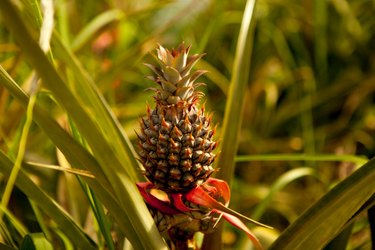
Mouth sores, a general term used to describe cold sores, canker sores and other kinds of irritation to the lining of the mouth, can result from ill-fitting dentures or braces, sharp or broken teeth, chewing tobacco, accidental biting and certain kinds of food or drinks. Acidic foods, especially orange juice, are a common culprit because they cause subtle tissue damage that is more keenly felt by people with existing sores or sensitive mouth tissue. Limiting acidic foods or consuming low acid foods after high acid foods can limit discomfort and reduce the risk of future outbreaks.
Definition
Video of the Day
Scientists define acidity in terms of pH, which means power of hydrogen. A pH between 1 and 6 means that something is acidic, while a pH between 8 and 14 means that somethings falls on the basic, or alkaline, end of the spectrum. A pH of 7 is considered neutral. According to the Food and Drug Administration, most foods favor the acid end of the spectrum, with pH levels between 3 and 7.
Video of the Day
Foods to Enjoy
People with mouth sores should focus on foods that contain low levels of acid. Grains such as barley and oatmeal and products made from grains like bread, cereal and crackers hover around neutral pH, as do legumes like kidney beans and chick peas. Animals, like humans, maintain their internal pH slightly above neutral, so foods that come from animals like meat, poultry, fish, eggs and most dairy products also follow this pattern. While almost all vegetables are safe, fruits pose a challenge. Good choices include melon, banana, coconut and figs. Milk, water, coffee and tea are good choices for beverages.
Foods to Limit
People prone to mouth sores should consume foods that contain medium levels of acid in moderation, or take precautions to limit tissue damage, like following with a food or beverage that is contains low levels of acid. Medium acid fruits and vegetables include apples, apricots, mangos, nectarines, oranges, peaches, pears, plums, tomatoes, green olives and peppers. Cream, cottage cheese and yogurts have medium levels of acid, unlike most other dairy products. Honey, pesto, mustard, mayonnaise and ketchup are medium acid condiments. Wine and buttermilk are medium-acid beverages.
Foods to Avoid
Many canned and processed foods are intentionally acidified to inhibit the growth of bacteria and prolong shelf life, so canned and processed foods should be avoided, at least during an active outbreak of mouth sores. Almost all fruit juices, jams and preserves also contain high levels of acid, as do foods like pickles and salad dressings that rely on vinegar as a main ingredient. Fresh fruits to avoid include summer berries, cherries, limes, lemons, grapefruit, pomegranate, pineapple and cranberries. Energy drinks and sodas represent high acid beverages. People who can't give these up should try drinking through a straw to minimize exposure to the tissues of the mouth.
Considerations
Mouth sore food triggers vary from person to person. Keeping a food diary or food recall can help identify individual triggers. With a food diary, a person records the types and quantities of foods she eats every day, even when she has no symptoms. With a food recall, a person records the types and quantities of foods she remembers eating during the 24 or 48 hours before a mouth sore appeared. If highly acidic foods seem to correlate with the appearance of mouth sores, the person should avoid them or consider alternative strategies such as following highly acidic foods with neutral or minimally acidic foods like bread to neutralize the damage.